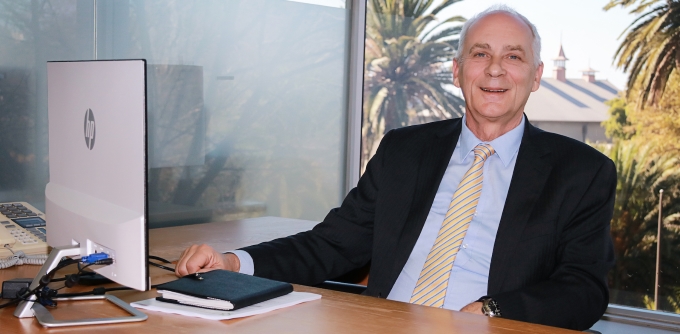
THC Global chief executive Ken Charteris. Source: Supplied.
Ken Charteris affectionately refers to his company’s gargantuan Southport-based refinement facility as “the Deathstar”.
But rather than blowing up Alderaan, this Deathstar is responsible for the extraction and refining of medicinal cannabis and is one of the largest facilities of its type in the southern hemisphere.
The company running the plant is THC Global, one of Australia’s premier players in the medicinal cannabis production and growing space, with operations across Australia, New Zealand and Canada. Charteris is the chief executive officer of THC, and tells SmartCompany that since the company’s acquisition of the plant, business has been booming.
“[The Deathstar] has quite significant value to us as a potential for exporting cannabis globally of pharmaceutical grade. That is a bit of a game changer on a global market,” he says.
THC was spun up in 2016, formed as the parent company behind medicinal cannabis startup Canndeo, and the business was formerly known as the Hydroponics Company. Charteris says it changed its name last year after opening operations globally, hence ‘THC Global’.
Though not the largest marijuana grower in Australia, THC is a top contender, though Charteris notes the industry is still emerging as legislation permitting cannabis as a controlled narcotic passed only two years ago.
“We’re just starting to see a few companies now getting a stake in the ground. We’re still an emerging industry in Australia, a long way away from what you might be used to reading about in places like Canada,” he says.
That doesn’t stop Charteris from being bullish on the future of the medicinal cannabis space Down Under though, saying there’s a quarter of a million forecasted patients in Australia and THC is focused on building out the right infrastructure to keep up with the eventual demand.
That demand is already manifesting itself in the nascent industry, with doctors, growers and pharmaceutical companies struggling to keep ahead of demand as more and more patients look to cannabis as a solution.
Charteris says the growth is hindered somewhat by Australia operating under a pharmaceutical cannabis model, meaning customers can’t just “go to the pot doctor” like they do in countries such as the US.
“It’s a much slower build, but once we get there the numbers are pretty straightforward: $1 billion in revenue per annum. That’s pretty significant for a new industry that’s not really competing with anyone else,” he says.
“Globally, that number reaches the trillions.”
Pot stocks and two smoking barrels
Charteris’ business, like almost every business operating in the industry locally, is listed on the Australian Stock Exchange (ASX), boasting a market capitalisation of $70 million and a current share price of 54 cents.
It joins the ranks of about 30 other listed companies making forays into the cannabis space, colloquially known as ‘pot stocks’. The companies’ share prices and market caps vary, but on the whole, they have seen their share prices steadily increase over the past 12 months.
Having so many companies public in a comparatively small industry is unusual, but Charteris says the reason for listing is fairly straightforward: starting a medicinal cannabis company is highly capital intensive.
“This is a brand new sector, you need capital. It’s that simple,” he says.
“You build infrastructure no different to a power station or a refinery. They take time to build, and you do it on a very strict regulation process, so you need access to capital.”
While the typical small-to-medium business would likely baulk at the compliance aspects of listing their company on the ASX, Charteris says it’s been a breeze compared with the compliance required to operate in the cannabis industry in the first place.
However, rather than lamenting the tightly bound red tape, Charteris welcomes it, saying it goes a long way towards keeping the space competitive.
“There are very strict rules about who can operate the companies, who your major shareholders are, what your facilities are like. You’re dealing with the office of drug control, you’re dealing with legislation, guidelines, all those requirements,” he says.
“You have to be fairly smart and organised. That’s why a lot of people complain about it, but it is a bit of a barrier of entry to others to be quite honest, and it keeps the standard high. You just can’t have an unregulated industry. So it works for us.”


COMMENTS
SmartCompany is committed to hosting lively discussions. Help us keep the conversation useful, interesting and welcoming. We aim to publish comments quickly in the interest of promoting robust conversation, but we’re a small team and we deploy filters to protect against legal risk. Occasionally your comment may be held up while it is being reviewed, but we’re working as fast as we can to keep the conversation rolling.
The SmartCompany comment section is members-only content. Please subscribe to leave a comment.
The SmartCompany comment section is members-only content. Please login to leave a comment.